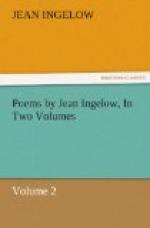Her burden she let fall, lo! the stone was gone;
Light was there within, out to the dark it shone;
With an angel’s face the dread tomb was bright,
The which she beholding fell for sore affright.
Mary of Magdala, in her misery,
Heard the white vision speak, and did straightway
flee;
And an idle tale seem’d the wild words she said,
And nought her heart received—nought was
comforted.
“Nay,” quoth the men He loved, when they
came to see,
“Our eyes beheld His death, the Saint of Galilee;
Who have borne Him hence truly we cannot say;”
Secretly in fear, they turn’d and went their
way.
Mary of Magdala, in her misery,
Follow’d to the tomb, and wept full bitterly,
Linger’d in the dark, where first the Lord was
laid;
The white one spake again, she was no more afraid.
In a moment—dawn! solemn, and sweet, and
clear,
Kneeling, yet she weeps, and some one stands anear;
Asketh of her grief—she, all her thoughts
are dim,
“If thou hast borne Him hence, tell me,”
doth answer Him.
“Mary,” He saith, no more, shades of night
have fled
Under dewy leaves, behold Him!—death is
dead;
“Mary,” and “O my Master,”
sorrow speeds away,
Sunbeams touch His feet this earliest Easter day.
After the pains of death, in a place unknown,
Trembling, of visions haunted, and all alone,
I too shall want Thee, Jesus, my hope, my trust,
Fall’n low, and all unclothed, even of my poor
dust.
I, too, shall hear Thee speak, Jesus, my life divine;
And call me by my name, Lord, for I am Thine;
Thou wilt stand and wait, I shall so look and SEE,
In the garden of God, I SHALL look up—on
THEE.
WOULD I, TO SAVE MY DEAR CHILD?
“Thou thoughtest that I was altogether such an one as thyself.”
Would I, to save my dear child dutiful,
Dare the white breakers on a storm-rent
shore?
Ay, truly, Thou all good, all beautiful,
Truly I would,—then truly Thou
would’st more.
Would I for my poor son, who desolate
After long sinning, sued without my door
For pardon, open it? Ay, fortunate
To hear such prayer, I would,—Lord,
Thou would’st more.
Would I for e’en the stranger’s weariness
And want divide, albeit ’twere scant,
my store?
Ay, and mine enemy, sick, shelterless,
Dying, I would attend,—O, Lord,
Thou more.
In dust and ashes my long infamy
Of unbelief I rue. My love before
Thy love I set: my heart’s discovery,
Is sweet,—whate’er I
would, Thou wouldest more.
I was Thy shelterless, sick enemy,
And Thou didst die for me, yet heretofore
I have fear’d; now learn I love’s supremacy,—
Whate’er is known of love, Thou
lovest more.
AT ONE AGAIN.
I. NOONDAY.




